Unit 9 Have you ever been to an amusement park? 现在完成时讲练课件[下学期]
文档属性
| 名称 | Unit 9 Have you ever been to an amusement park? 现在完成时讲练课件[下学期] | 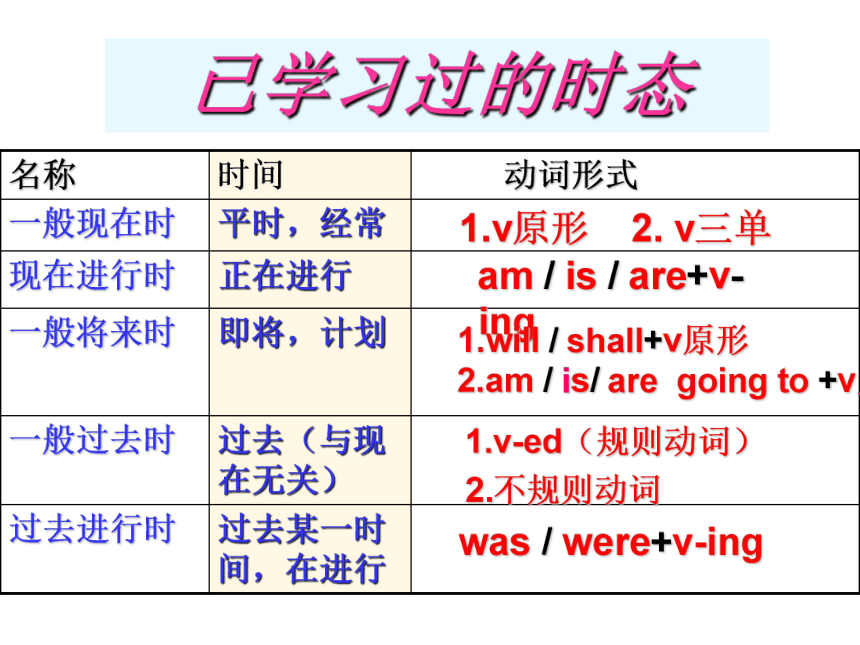 | |
| 格式 | rar | ||
| 文件大小 | 3.5MB | ||
| 资源类型 | 教案 | ||
| 版本资源 | 人教新目标(Go for it)版 | ||
| 科目 | 英语 | ||
| 更新时间 | 2007-08-14 07:36:00 | ||
图片预览

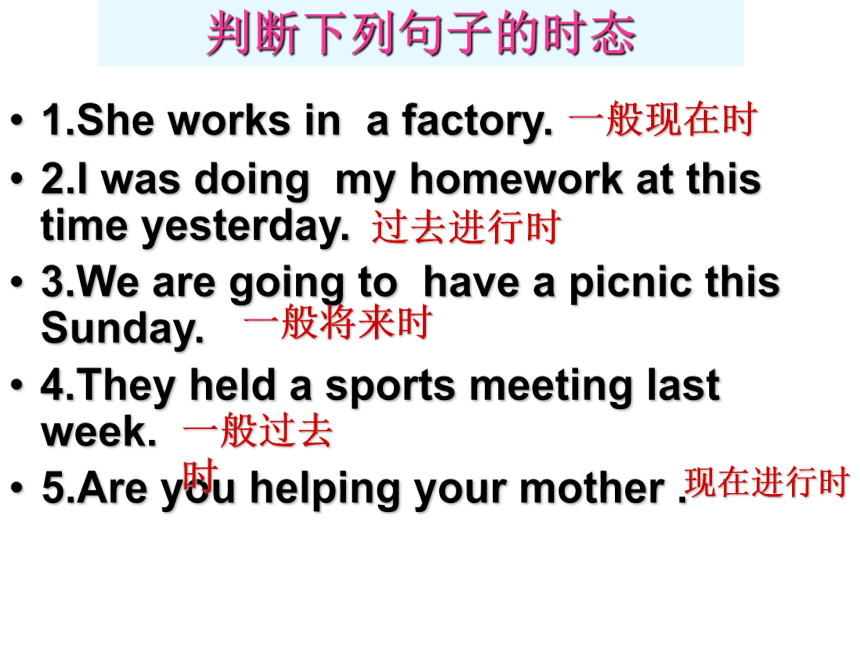



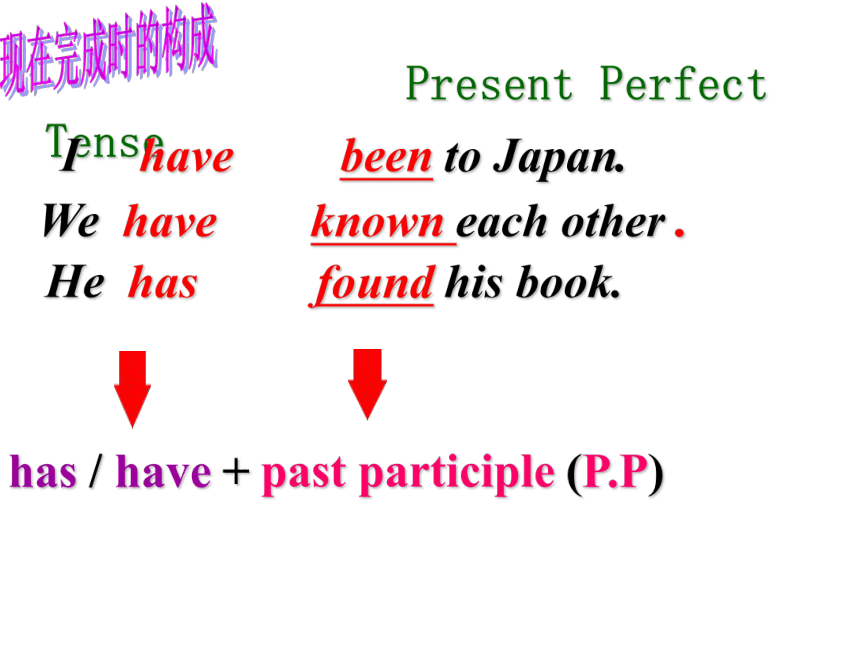
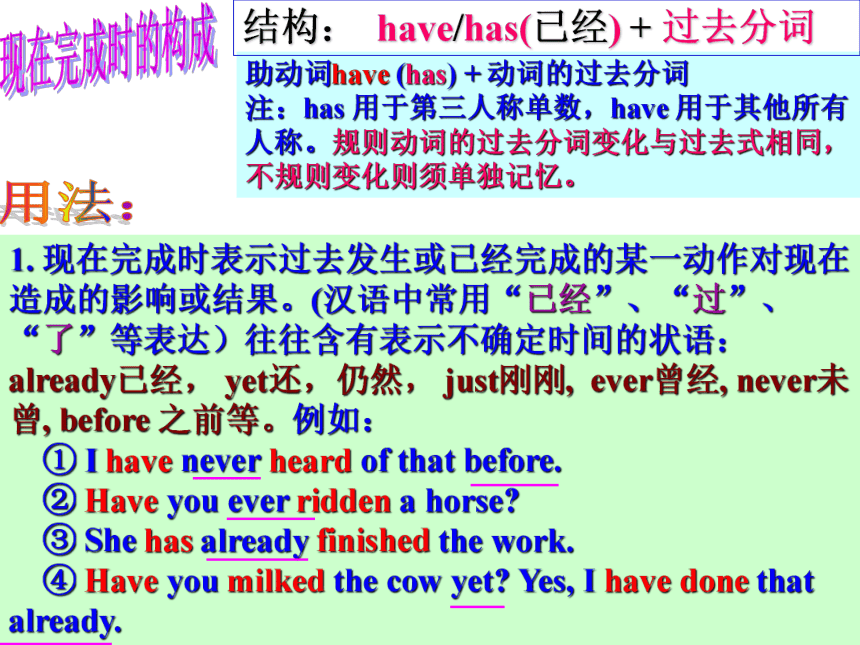


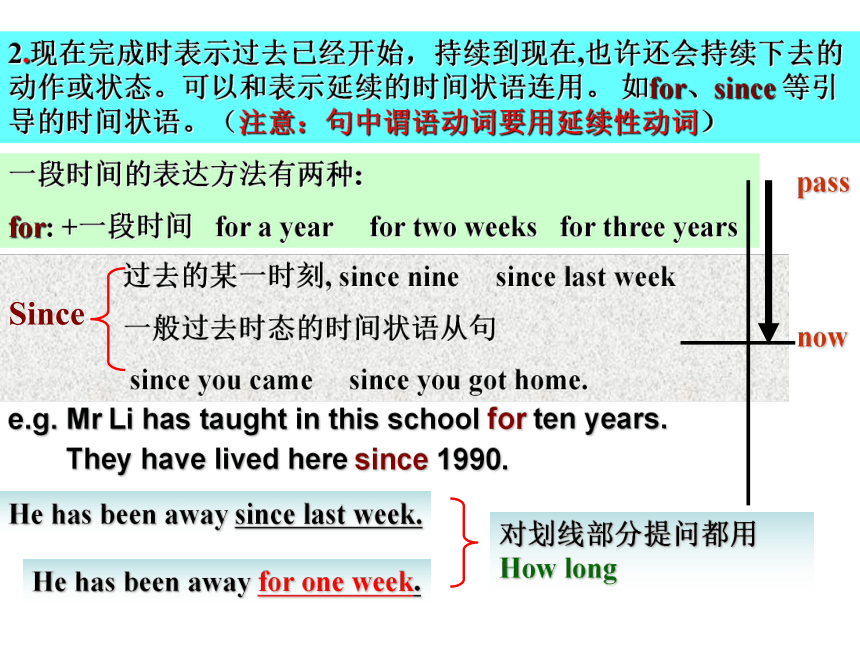
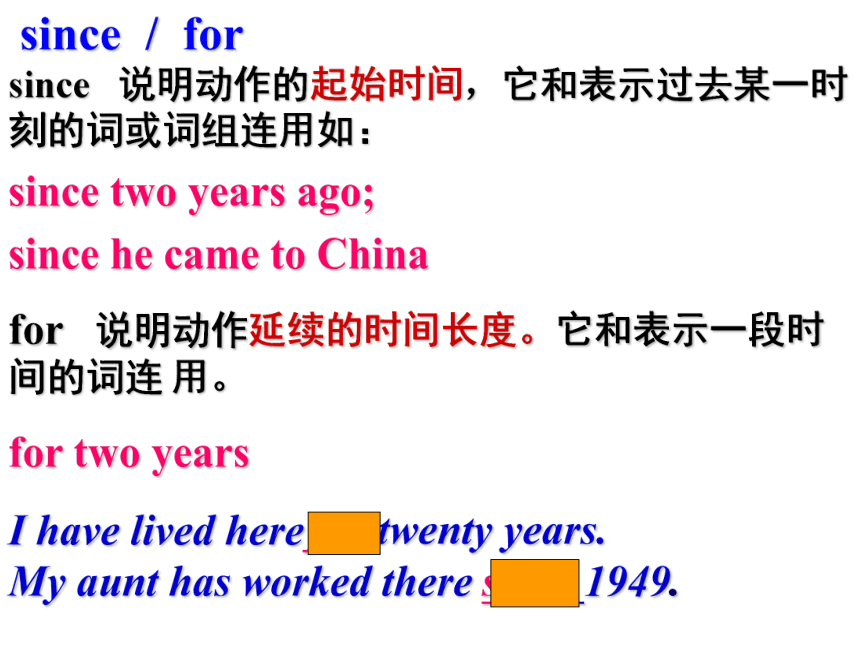
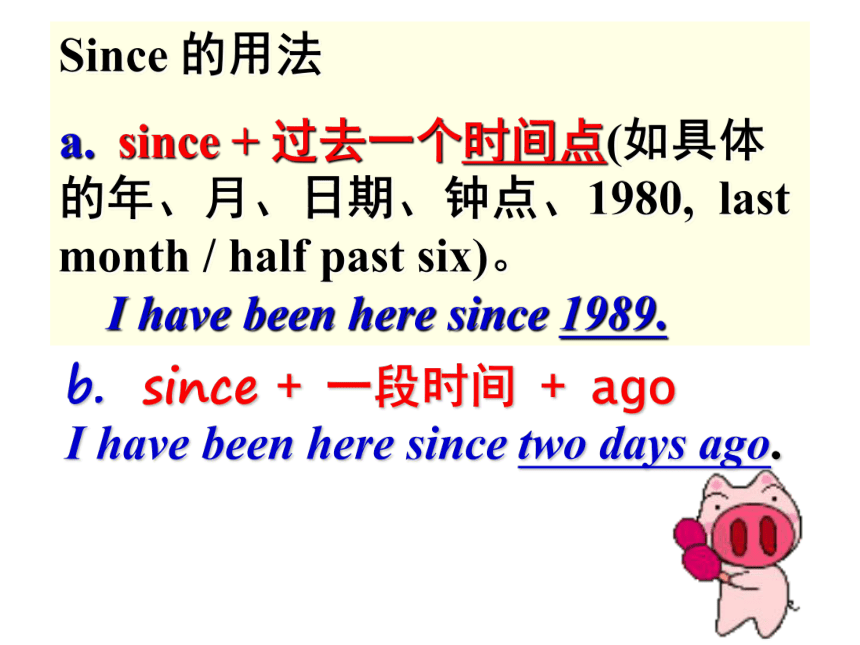
文档简介
课件103张PPT。已学习过的时态1.v原形 2. v三单am / is / are+v-ing1.will / shall+v原形
2.am / is/ are going to +v原形
1.v-ed(规则动词)
2.不规则动词was / were+v-ing判断下列句子的时态1.She works in a factory.
2.I was doing my homework at this time yesterday.
3.We are going to have a picnic this Sunday.
4.They held a sports meeting last week.
5.Are you helping your mother .一般现在时过去进行时一般将来时一般过去时现在进行时Present Perfect Tense现在完成时态是中考
的必考时态,由于现
在完成时态既涉及到
过去,又联系到现在,和一般
过去时态,一般现在时态,现在进行
时态既有联系,又有区别,所以
同学们掌握起来比较
困难。
现在完成时怎么用呢?
请看动画: Present Perfect Tensehas / have + past participle (P.P) I have been to Japan.We have known each other .He has found his book. 现在完成时的构成1. 现在完成时表示过去发生或已经完成的某一动作对现在造成的影响或结果。(汉语中常用“已经”、“过”、“了”等表达)往往含有表示不确定时间的状语:already已经, yet还,仍然, just刚刚, ever曾经, never未曾, before 之前等。例如:
① I have never heard of that before.
② Have you ever ridden a horse?
③ She has already finished the work.
④ Have you milked the cow yet? Yes, I have done that already.
⑤ I’ve just lost my math book. 现在完成时的构成助动词have (has) + 动词的过去分词
注:has 用于第三人称单数,have 用于其他所有人称。规则动词的过去分词变化与过去式相同,不规则变化则须单独记忆。用法:结构: have/has(已经) + 过去分词 表示经历或经验。常与ever(曾经)或never(未曾)连用。如:
Have you ever been to Hong Kong?
I’ve never traveled by air.
表示最近发生的动作或情况。常与yet(还,仍然)或already(已经)连用。如:用 法I have already written to her.
She hasn’t spent much time on it yet. 表示刚刚发生过的动作或事情,常与just连用。
They have just sent us a telegram.
She has just come here. 表示过去发生,目前还有可能仍在继续下去的动作或事情。常与since或for连用。
He has lived there since 1950.
We have known each other for more than ten years.2.现在完成时表示过去已经开始,持续到现在,也许还会持续下去的动作或状态。可以和表示延续的时间状语连用。 如for、since 等引导的时间状语。(注意:句中谓语动词要用延续性动词)一段时间的表达方法有两种:
for: +一段时间 for a year for two weeks for three years 过去的某一时刻, since nine since last week
一般过去时态的时间状语从句
since you came since you got home.He has been away since last week.He has been away for one week.对划线部分提问都用How longSincee.g. Mr Li has taught in this school for ten years.They have lived here since 1990. pass
now?since / for since 说明动作的起始时间,它和表示过去某一时刻的词或词组连用如:
since two years ago;
since he came to China
for 说明动作延续的时间长度。它和表示一段时间的词连 用。
for two years
I have lived here for twenty years. My aunt has worked there since 1949.Since 的用法
a. since + 过去一个时间点(如具体的年、月、日期、钟点、1980, last month / half past six)。 I have been here since 1989.b. since + 一段时间 + ago I have been here since two days ago.c. since +从句 Great changes have taken place since you left. She has changed a lot since we got here. d. It is + 一段时间 + since 从句 It is two years since I became a graduate .It is = It has beena. since + 过去一个时间点b. since + 一段时间 + agoc. since +从句d. It is + 一段时间 + since 从句I have been here since 1989.=I have been here since 17 years ago.=It is 17 years since I came here . =I have been here for 17 years.It is two years since I became a graduate.= I have been a graduate for two years .= I have been a graduate since two years ago . = I have been a graduate since 2004. 与现在完成时连用的时间状语1.表示现在刚刚完成的动作,常和下列副词连用just (刚刚) already (已经) yet(然而) recently/lately(最近)
so far/ by now / up to know(目前)
these+一段时间
this week / month / year(这个星期/月/年)2.表示经验,常和下列副词连用never( 从不) ever(曾经) before(以前) once(一次)
twice(两次) three times(三次)…3.表示过去继续到现在的动作或状态,常与for短语,since短语/从句连用4.下列短语多和现在完成时连用
in /for/during the last /past+段时间(在过去的…时间)they, finish,
homeworkThey haven’t finished their homework.Have they finished their homework?
Yes, they have. / No, they haven’t.They have finished their homework.肯定式、否定式和疑问式
I have got a special gift.
I have not got any special gift.
I have never got any special gift.
Have you got any special gift?
Yes, I have. / No, I haven’t.
He has ever played golf.
He has not ever played golf.
He has never played golf.
Has he ever played golf?
Yes, he has. / No, he hasn’t.
助动词(have/has)没有词义,但往往可以理解为“已经”之意。翻译:I have cleaned the kitchen.翻译:Mum has cooked dinner for the family.翻译:Uncle Li has travelled to Tibet.
助动词(have/has)+ not没有词义,但往往可以理解为“还没有”之意。翻译: I haven’t found my lost bike.翻译:Junia hasn’t seen the film.翻译: I haven’t cleaned the kitchen.翻译: They haven’t had lunch.翻译:Mum hasn’t cooked dinner.翻译:Uncle Li hasn’t travelled to Tibet.现在完成时(一般疑问句):助动词(Have/Has) +主语+过去分词+其它?翻译:Have you seen my lost book?翻译:Has Kate known the news?翻译: Have you finished your work?翻译: Have they visited Harbin?翻译: Has Lucy learned swimming?翻译:Has your friend emailed to you?现在完成时(特殊疑问句):特殊疑问词+助动词(have/has) +主语+过去分词+其它?翻译: Who has emailed to you?翻译: What has happened?翻译: Where has Mr. Black gone?翻译: How long have you lived here?翻译:How many times has he read the book?Forms of the present perfect Statement (肯定句): have / has + p.p. Negative (否定句) : have / has not + p.p.Question (疑问句) :
Have / Has + sub. + p.p ...?
现在完成时动词构成:
have / has + v 过去分词
助动词否定haven’t
hasn’t疑问Have you……?
Has he……?----Have you seen the film?
---- Yes, I .
---- No, I .
e.g. I have finished my homework.
否定句: I my homework.
一般疑问句: you _ homework?
肯定回答: Yes, I .
否定回答: No, I .
haven’t finished Have finished your havehaven’thavehaven't 肯定: She has seen the film.
否定: She hasn't (has not) seen the film.
疑问: ---- she the film?
----Yes, she .
----No, she .
e.g. She has finished her homework.
否定句: She her homework.
一般疑问句: she her homework?
肯定回答: Yes, she .
否定回答: No, she .has hasn'thasn’t finishedHas finishedhashasn’tHas seen have/has gone to (Beijing) have/has been to (Beijing) have/has been in (Beijing)have/has gone to...
“(某人)正在前往 (某地)的途中” 或“刚刚 到达某地”,
所以, 他/她现在 “不在说话现场”, 或“ 还没有回来”,你在教室里寻找 Bob,但 Bob 不在,你就问 Jack :
----(You): Where is Bob, Jack?
----(Jack):Oh, he the school library.
(在途中或刚到达) (曾去过但已返回)(去了并留在那里)has gone to"have/has been to..."(某人)曾经去/到过 (某地), 但现在已经返回(=is back now)说话地。
(半小时后,Bob 在图书馆借好了杂志回到教室,你看到手里拿着新杂志的刚回来 Bob,你问 Bob: )
(You):---Where you , Bob?
(Bob):---Oh, I the school library.
have beenhave been tohave/has been in (Beijing)Linda 两星期前去了北京旅游,到今天还没有回来,所以 “她在北京已经呆了两周了。”,我们说:
Linda Beijing for two weeks.
Or:
Linda Beijing since two weeks ago. has been/stayed in has been/stayed in
(3) have been (to)和have gone (to)的区别:
★have / has been (to) 表示“曾经到过某地”,说话时此人不在那里,已经回来。侧重指经历。
★have / has gone (to) 表示某人“已经去某地了”,说话时此人可能在路上或已到那里,反正不在这里。
试比较:
He has been to Beijing. 他曾去过北京。
(人已回来,可能在这儿)
He has gone to Beijing. 他已经去北京了。
(人已走,不在这儿)。? 用have gone to和have been to完成句子。
1.????? 她到上海去了。
She _____ _______ _____ Shanghai.
2.????? 她到过上海。
She ______ _______ ________ Shanghai.
3.????? 他上哪儿去了?
Where ______ he ________?
4.????? 他到过哪儿了?
Where ______ he _________?
5.????? 我到过图书馆。
I ____ _____ _____ the library. has gone to
has been to
has gone
has been
have been to现在完成时与一般过去时有何区别呢?请看:
Time
yesterday He hurt his finger yesterday.He has hurt his finger.Simple PastPresent Perfect Time
??????hurtTime
last night He found his cat last night.He has found his cat.Simple PastPresent PerfectTime
??????findTime Simple PastPresent PerfectTimeyesterday / last week / in 1976 / just now / when I came in … / two days ago never / ever / yet / already / before / just / lately / so far / recently / these days/ since two days ago一般过去时与现在完成时之比较 1)一般过去时表示过去某时发生的动作或单纯叙述过去的事情,强调动作,和现在不发生关系。而现在完成时表示过去发生的某一动作对现在造成的影响或结果,强调的是现在的情况。
2)一般过去时常与具体的时间状语连用,而现在完成时通常与模糊的时间状语连用,或无时间状语。
◎ 一般过去时的时间状语有:yesterday, last week,…ago, in1980, in October, just now,等具体的时间状语。
◎ 共同的时间状语有:this morning, tonight, this summer, before, already,等。
◎ 现在完成时的时间状语有:for, since, ever, never, just, already, yet, in past years等不确定的时间状语。1. already( 已经) (not) yet (还没有…)
…yet? (…已经…吗?);
2. never (从不), ever (曾经)
3. just(刚刚)
before (从前,以前)
4. recently / lately(近来/最近),
in the last/past few ( days / weeks / months/ years)
在最近的几…
5. these days/ weeks/ months (这些…来)
6. so far= up to now(迄今为止,到目前为止)
7. for + 一段时间
8. since+ 过去的时间 ( 自从…到现在) She has already come .
I have met him before .
So far, no man has traveled farther than the moon .
I haven’t finished my work yet .
He has just had dinner .
Have you ever been to Paris ? 表示过去某时发生的动作或情况,与现在毫无关系.当有一个表示过去某时的状语时,不能用现在完成时,而多用一般过去时。
I saw Mary an hour ago.
She lost her handbag yesterday .Next现在完成时与一般过去时的区别 现在完成时强调动作或事情发生在过去,但它强调的却是与现在的关系,用来说明现在的情况.一直延续到现在,而且还有可能继续延续下去;而一般过去时只表示发生在过去的动作或事情。
I have taught this class for ten years. (还在教)
I taught this class for two years. (曾教过两年,现在不教了)A: ______ you ______ the film Harry Potter?
B: Yes, I ______. It is very interesting.
A: When ______ you ______ it?
B: I ______ it six years ago ( in 2000).
A: Where ______ you ______ it?
B: I ______ it at the Nanguo Cinema.Haveseenhavedidseesawdidseesaw请大家认真分析比较下列各例句:
I saw this film yesterday.
(只说明动作发生在过去。)
I have seen this film.
(强调对现在的影响,电影的内容已经知道了。)
She has returned from Paris.
(她已从巴黎回来了。)
She returned yesterday.
(她是昨天回来的。)
He has been in the League for three years.
(在团内的状态可延续)
He joined the League three years ago.
( 三年前入团,joined为短暂行为。)
注意:句子中如有一般过去时的时间副词(如 yesterday, last week, in 1960)时,不能使用现在完成时,要用过去时。例如:
(错)Tom has written a letter to his parents last night.
(对)Tom wrote a letter to his parents last night.
注意:现在完成时表示过去发生的某一动作对现在造成的影响和结果,强调现在的情况,不和表示过去的时间状语连用。表示过去的时间状语有:in 2003, five months ago, last week, yesterday, last night, just now, a moment ago等。 I saw it on Lin Tao’s desk five minutes ago.
saw 能用have seen代替吗?Lily bought a book yesterday.
bought 能用has bought代替吗?I have put it on the shelf a moment ago.× I put it on the shelf a moment ago.①.我们买这本书三年了.We have had the book for three years.②他感冒三天了.He has had a cold for three days.We bought the book three years ago. He caught a cold three days ago.一般过去时态和现在完成时态可以构成同义句③自从上星期以来,我就借了这本书. I have kept the book since last week.④我成为一个学生两年多了. I have been a student for over two years. I borrowed the book last week.I became a student two years ago.⑤ Mr Black死了三年了。Mr Black has been dead for three years.Mr Black died three years ago.⑥小明参军半年了。Xiao Ming has been a soldier for half a year.Xiao Ming joined the army half a year ago.⑦我们上了8年学了。We have been students for eight years.⑧下课10分钟了 The class has been over for ten minutes.9.电影开始了一小时了 The film has been on for an hour.10. 门打开半小时了The door has been open for half an hour.“瞬间动词(也叫‘短暂动词’)” 和 “延续性动词”1、瞬间动词:
从“开始发生”到 “结束/终止”:
几乎同时或在极短的时间里(如‘几秒钟/几分钟内’)就完成了“开始—结束”的过程,如 “Close the door”, “Open the door”
有些瞬间动词的“开始—结束的过程” 可能稍微长一些,但也不会很长的,如,
“buy sth(买下)”:付了款、拿了发票即完成了。
所以, “我买了这块手表5年了”,在汉语中说的通,但英语的表达就不能说:
I have bought the watch for five years.
buy sth ---- have sth (拥有)---have/has + had sth for…
A: I have had the watch for 5 years.
B: It is (has been) five years since I bought the watch.
C: I bought it 5 years ago. 现在完成时与瞬间动词 同理, “borrow sth” “借书”在办理了相关的‘登记’手续后就 结束了,不可能“借” 几个星期 或好几年的! 汉语“这本书我已经借用了2星期了。” 的意思是:
“我两周前 (borrowed it),(在归还前)现在它还在我手里(I still have it or I’m still reading it.)
Right or Wrong?
A: I have borrowed the book for two weeks.
B: I have had / kept it for two weeks.
C: It’s 2 weeks since I borrowed it.
D: I borrowed it 2 weeks ago.
(Wrong)(Right)(Right)(Right)现在完成时与瞬间动词 瞬间动词可以用于现在完成时,但不能和表示一段时间的状语连用。如可说“He has left.”但不能说“He has left for three years.” 如果要表达“他已走了三年了”可用以下几种表达法:一、用ago,使用一般过去时。
He left here three years ago.二、用“It is +一段时间+since +一般过去时从句 ”
It is three years since he left here.三、用“ 一段时间+have/ has passed + since + 一般过去时从句”Three years have passed since he left here.以上三种表示方法适用于所有瞬间动词。 另外,还可用其它表示方法,但只适用于部分瞬间动词。具体办法是将瞬间动词转化为表延续的动词或者表状态的be+名词/形容词或副词/介词短语等。1.直接转化成延续性动词
buy catch (get) a cold
borrow/lend come/go /become have have a coldkeepbeput onweare.g.这本书我买了三个月了。I have bought this book for three months.xhad__________√2.转换成be+名词/介词短语
join the army
join the Party
go to school be a soldier be a Party memberbe a student3转换成be+形容词或副词
die finish begin/start
leave fall sleep/ill
close openbe deadbe overbe onbe away
from(地点)be asleep/ill be closedbe opengo outbe outget upbe upe.g.他去世五年了。He has died for five years.been dead _____x/be in school/ be in the army / be in the Partyarrive/come/reach be in /at +地点staye.g.他自从1985就参军了。He has been a soldier since 1985.
He has been in the army since 1985.D.去掉短语中的结束性动词get to know
begin to study
come to work
knowstudyworke.g.自从十年前我就认识他。I have known him since ten years ago.Practice: 瞬间动词和延续性动词、状态句型转化练习(1):1、你来晚了,电影已放了10分钟了。
A: You are late. The film for 10 minutes.
B: You are late. It ten minutes since the film .
C: You are late. The film 10 minutes .
2、我叔叔当兵已经有2年了。
A: My uncle the army for 2 years.
B: It 2 years my uncle joined the army.
C: My uncle the army 2 years ago.
3、Linda 已经感冒4、5天了。
A: Linda a cold 4 to 5 days.
B: It 4 to 5 days since Linda a cold
C: Linda a cold 4 or 5 days .has been onisbegan/startedbegan/startedhas been inissincejoinedhas hadforiscaughtcaughtagoagoPractice: 瞬间动词和延续性动词、状态句型转化练习 (2):4、他爷爷去世已经有5年了。
A: His grandpa for 5 years.
B: It 5 years since his grandpa .
C: His grandpa 5 years .
5、你来晚了,火车已经开走了20分种了。
A: You’re late. The train for 20 minutes.
B: It 20 minutes since the train .
C: The train 20 minutes .
6、他们到深圳已经有3年多了。
A: They Shenzhen for over 3 years.
B: It over 3 years since they Shenzhen.
C: They Shenzhen over 3 years .has been deadis died died ago has been away isleftleft ago have been/stayed in isarrived at
got to/ reachedarrived at
got to/ reachedago区分短暂性动词与持续性动词.
表示短暂性(瞬间性)的动词在现在完成时的句中不能和一段时间连用.即for,since短语或how long问句.动词的过去分词的变化规律以动词go为例,go是动词原形, goes是单数第三人称形式,went是过去式, going是现在分词,而gone则是它的过去分词。规则动词的过去分词 work
visit
ask
play
stay三式相同不规则动词的过去分词一、A A A 型
原形、过去式和过去分词同形:
??????????feel
leave
tell
sell
say
lay
find
get
have二、A B B 型 过去式和过去分词同形:
??????????
???? hear heard heard
????????????hold held held
????????????keep kept kept
????????※learn learnt learnt
????????????lend lent lent
????????????make made made
????????????meet met met pay paid paid
send sent sent
sit sat sat
sleep slept slept
※smell smelt smelt 二、A B B 型 过去式和过去分词同形:
??????????
??? spend spent spent
?????stand stood stood
????understand understood ??????understood 二、A B B 型 过去式和过去分词同形:??????????begin
fall
fly
forget
take
wear
write
be
break
do四、A B C 型 原形、过去式和过去分词各异
??????????三、A B A 型 原形与过去分词同形
??????????四、A B C 型 原形、过去式和过去分词各异
?????????? ????????????????????????????
????????????draw drew drawn
????????????drink drank drunk
????????????drive drove driven
????????????eat ate eaten
??????????????? give gave given
????????????go went gone
????????????grow grew grown
????????????know knew known
????????????lie lay lain
????????????ride rode ridden
????????????
??? ? ring rang rung
???????????? see saw seen
??????????? ?show showed shown
???????????? sing sang sung
??????????? ?speak spoke spoken
??????????? ?swim swam swum
????????????四、A B C 型 原形、过去式和过去分词各异
??????????
??? take took taken
????????????throw threw thrown
????????????wake woke woken
????????????
????????????五、A A B 型 原形与过去式同形
??????? beat beat beaten
?????????? lie / lied / lied??说谎
lie / lay / lain?躺下,位于,平放
lay/ laid /laid?? 放置;下蛋 ????????????现在完成时“三看三用”一看时间状语。如果句中没有表示过去确切时间的状语,常用现在完成时;如果有,则只能用一般过去时。如:
I have visited the factory.
I visited the factory last year.二看句首有无疑问词。如果笼统地问人家做过某事了吗(句首无疑问词),常用现在完成时;但进一步询问何时、何地、何原因、用什么方式做那事时(句首有疑问词)就要用一般过去时。如:-Have you had your breakfast? -Yes, I have.
-When did you have it? -At seven thirty.1. 现在完成时可和疑问词where, why, how等连用,
但不能和when / what time连用Why have you turned off the TV?(你为什么关掉电视?)你什么时间关上的?X√2. 终止性动词的现在完成时否定式已成为一种可延续性状态,
因此可以和表一段时间的时间状语连用.e.g.自从1985年,他就没离开过这.He hasn’t left here since 1985.三看句中谓语动词是否为延续性动词。如果表示的动作或状态一直延续到现在,最好选用延续性动词,并使用现在完成时;如果是瞬间动词,则用一般过去时。如:
He has been a league member for two months.
He joined the Youth League two months ago.1. Where _____ you _____, John? I’m looking for you everywhere.
A. have; been B. have ;been to
C. have; gone D. did; go to
2. How long _____ your father _____ Shanghai?
A. did; come B. has; go to
C. has; been to D. has; been in选 择A. have; beenD. has; been inExercises3. I _____ my watch in my bedroom yesterday.
A. left B. forgot
C. have forgotten D. have left
4. She has worked in the factory _____.
A.since three years ago B. for 1999
C. since in 1999 D. since three yearsA. leftA.since three years ago( )1.You’ve never seen such a wonderful film before, _______?
A. haven’t you B. have you C. do you D. don’t you
( ) 2. —I have watched the game.
—When ____ you ____ it?
A. have; watched B. do; watch C. did ;watch D. will; watch( )3. Mr. Green ____ in China since five years ago.
A. lived B. has lived C. lives D. is going to live
( )4. His grandma ______ for two years.
A. died B. has died C. was dead D. has been dead BCBD( )5. –Where is Han Mei now?
- She ____ to Shanghai. She will be back in two days.
A. has gone B. has been C. goes D. had gone
( )6. -_____ you ____to the United Stated ?
- No, never,but I went to Canada a few years ago
A. Have; been B. Have; gone C. Did; go D. Do; go( )7. You haven’t changed your mind,_______?
A. do you B. are you C. have you D. did you( )8. How long have you _____ the football team of
the school?
A. played B. been at C. joined D been on AACD( )9. —Where have you _____ these days?
—I have _____ to Kunming with my friends.
A been , gone B been , been C gone , been D gone, gone
( )10. How long have you ____ this book?
A. bought B. borrowed C. had D. lent
( )11. —Excuse me, ____ you seen the film yet?
—Yes, I _____ it last night.
A have, see B have, have seen C have, seen D have, saw
( )12. He has never ridden a horse before,_____?
A. is he B. isn’t he C. hasn’t he D. has heBCDDEXERCISES:
1.( )I ________heard of that story before.
A. don’t have B. not have C. have not D. not to have
2.( )She’ s never been to that factory,_________?
A. is she B. was she C. does she D. has she
3.( )Have you made dumplings__________? No, I haven’t.
A. just now B. yesterday C. ago D. before
4.( )Tom________ ill since last night.
A. was B. is C. has been D. be
5.( )How long have you_ ________ Nanjing?
About two years.
A. gone to B. been to C .been in D. went to CDDCC6.( ) How many times has Jim _______that park? Twice.
A. gone to B. been to C. been in D. went to
7.( )I’ve______ this dictionary for half a year.
A. bought B. had C. lended D. borrowed
8.( )She won’t go to the cinema this evening because she
________the film before.
A. has seen B. saw C. sees D. is seeing
9.( )Mr Li_______posted his letter_______.It’s still on his desk.
A. has,already B. hasn’t,yet C. has,yet D. hasn’t,already
10.( )The shop_______for about seven years.
A.is opening B.has opened C.opening D.has been open
BBBAD1. 她成为一名护士已经三年了。
2. 我五年前就认识李雷了。
3. 那些相片我已经寄给他了。(post)
4. 我来到这个学校后,他就一直教我。
5. 我刚丢了我的历史书。She has been a nurse for three years.I have known Lilei since five years ago. I have already posted the photos to him.He has taught me since I came to the school.I have just lost my history book. 同意句
1.I borrowed the library book two days ago.
I _______ _______the library book________two days.
2.The meeting started ten minutes ago.
A. The meeting________ _________ _________ _________ten minutes ago.
B. The meeting________ _________ ___________ ________ten minutes.
3.My brother joined the Party last year.
A. My brother _________ _________ ________the Party since last year.
B. My brother__________ ________ _______ party member since last year.
4.He left Nanjing two years ago.
He_________ _________ ________ ________Nanjing for two years.
have keptforhas been onhas been onhas been inhas been ahas been away fromsincefor5.That dog died last month.
That dog________ _________ ________since last month.
6.He has had the bike for two years.
A.Two years________ _________since he ________the bike.
B.It’s ______ __________since he_________the bike.
C.He _______the bike two years__________.
has been deadhas passedboughttwo years boughtbought ago改错:How long have you become a league member?
For more than one year.
Have you arrived here since last night.
Yes,you’re right.
The dog has died for a month.
He has gone to Shanghai twice.
How long have been at this school?
Since two years . beenbeenbeen deadbeen ago.For
2.am / is/ are going to +v原形
1.v-ed(规则动词)
2.不规则动词was / were+v-ing判断下列句子的时态1.She works in a factory.
2.I was doing my homework at this time yesterday.
3.We are going to have a picnic this Sunday.
4.They held a sports meeting last week.
5.Are you helping your mother .一般现在时过去进行时一般将来时一般过去时现在进行时Present Perfect Tense现在完成时态是中考
的必考时态,由于现
在完成时态既涉及到
过去,又联系到现在,和一般
过去时态,一般现在时态,现在进行
时态既有联系,又有区别,所以
同学们掌握起来比较
困难。
现在完成时怎么用呢?
请看动画: Present Perfect Tensehas / have + past participle (P.P) I have been to Japan.We have known each other .He has found his book. 现在完成时的构成1. 现在完成时表示过去发生或已经完成的某一动作对现在造成的影响或结果。(汉语中常用“已经”、“过”、“了”等表达)往往含有表示不确定时间的状语:already已经, yet还,仍然, just刚刚, ever曾经, never未曾, before 之前等。例如:
① I have never heard of that before.
② Have you ever ridden a horse?
③ She has already finished the work.
④ Have you milked the cow yet? Yes, I have done that already.
⑤ I’ve just lost my math book. 现在完成时的构成助动词have (has) + 动词的过去分词
注:has 用于第三人称单数,have 用于其他所有人称。规则动词的过去分词变化与过去式相同,不规则变化则须单独记忆。用法:结构: have/has(已经) + 过去分词 表示经历或经验。常与ever(曾经)或never(未曾)连用。如:
Have you ever been to Hong Kong?
I’ve never traveled by air.
表示最近发生的动作或情况。常与yet(还,仍然)或already(已经)连用。如:用 法I have already written to her.
She hasn’t spent much time on it yet. 表示刚刚发生过的动作或事情,常与just连用。
They have just sent us a telegram.
She has just come here. 表示过去发生,目前还有可能仍在继续下去的动作或事情。常与since或for连用。
He has lived there since 1950.
We have known each other for more than ten years.2.现在完成时表示过去已经开始,持续到现在,也许还会持续下去的动作或状态。可以和表示延续的时间状语连用。 如for、since 等引导的时间状语。(注意:句中谓语动词要用延续性动词)一段时间的表达方法有两种:
for: +一段时间 for a year for two weeks for three years 过去的某一时刻, since nine since last week
一般过去时态的时间状语从句
since you came since you got home.He has been away since last week.He has been away for one week.对划线部分提问都用How longSincee.g. Mr Li has taught in this school for ten years.They have lived here since 1990. pass
now?since / for since 说明动作的起始时间,它和表示过去某一时刻的词或词组连用如:
since two years ago;
since he came to China
for 说明动作延续的时间长度。它和表示一段时间的词连 用。
for two years
I have lived here for twenty years. My aunt has worked there since 1949.Since 的用法
a. since + 过去一个时间点(如具体的年、月、日期、钟点、1980, last month / half past six)。 I have been here since 1989.b. since + 一段时间 + ago I have been here since two days ago.c. since +从句 Great changes have taken place since you left. She has changed a lot since we got here. d. It is + 一段时间 + since 从句 It is two years since I became a graduate .It is = It has beena. since + 过去一个时间点b. since + 一段时间 + agoc. since +从句d. It is + 一段时间 + since 从句I have been here since 1989.=I have been here since 17 years ago.=It is 17 years since I came here . =I have been here for 17 years.It is two years since I became a graduate.= I have been a graduate for two years .= I have been a graduate since two years ago . = I have been a graduate since 2004. 与现在完成时连用的时间状语1.表示现在刚刚完成的动作,常和下列副词连用just (刚刚) already (已经) yet(然而) recently/lately(最近)
so far/ by now / up to know(目前)
these+一段时间
this week / month / year(这个星期/月/年)2.表示经验,常和下列副词连用never( 从不) ever(曾经) before(以前) once(一次)
twice(两次) three times(三次)…3.表示过去继续到现在的动作或状态,常与for短语,since短语/从句连用4.下列短语多和现在完成时连用
in /for/during the last /past+段时间(在过去的…时间)they, finish,
homeworkThey haven’t finished their homework.Have they finished their homework?
Yes, they have. / No, they haven’t.They have finished their homework.肯定式、否定式和疑问式
I have got a special gift.
I have not got any special gift.
I have never got any special gift.
Have you got any special gift?
Yes, I have. / No, I haven’t.
He has ever played golf.
He has not ever played golf.
He has never played golf.
Has he ever played golf?
Yes, he has. / No, he hasn’t.
助动词(have/has)没有词义,但往往可以理解为“已经”之意。翻译:I have cleaned the kitchen.翻译:Mum has cooked dinner for the family.翻译:Uncle Li has travelled to Tibet.
助动词(have/has)+ not没有词义,但往往可以理解为“还没有”之意。翻译: I haven’t found my lost bike.翻译:Junia hasn’t seen the film.翻译: I haven’t cleaned the kitchen.翻译: They haven’t had lunch.翻译:Mum hasn’t cooked dinner.翻译:Uncle Li hasn’t travelled to Tibet.现在完成时(一般疑问句):助动词(Have/Has) +主语+过去分词+其它?翻译:Have you seen my lost book?翻译:Has Kate known the news?翻译: Have you finished your work?翻译: Have they visited Harbin?翻译: Has Lucy learned swimming?翻译:Has your friend emailed to you?现在完成时(特殊疑问句):特殊疑问词+助动词(have/has) +主语+过去分词+其它?翻译: Who has emailed to you?翻译: What has happened?翻译: Where has Mr. Black gone?翻译: How long have you lived here?翻译:How many times has he read the book?Forms of the present perfect Statement (肯定句): have / has + p.p. Negative (否定句) : have / has not + p.p.Question (疑问句) :
Have / Has + sub. + p.p ...?
现在完成时动词构成:
have / has + v 过去分词
助动词否定haven’t
hasn’t疑问Have you……?
Has he……?----Have you seen the film?
---- Yes, I .
---- No, I .
e.g. I have finished my homework.
否定句: I my homework.
一般疑问句: you _ homework?
肯定回答: Yes, I .
否定回答: No, I .
haven’t finished Have finished your havehaven’thavehaven't 肯定: She has seen the film.
否定: She hasn't (has not) seen the film.
疑问: ---- she the film?
----Yes, she .
----No, she .
e.g. She has finished her homework.
否定句: She her homework.
一般疑问句: she her homework?
肯定回答: Yes, she .
否定回答: No, she .has hasn'thasn’t finishedHas finishedhashasn’tHas seen have/has gone to (Beijing) have/has been to (Beijing) have/has been in (Beijing)have/has gone to...
“(某人)正在前往 (某地)的途中” 或“刚刚 到达某地”,
所以, 他/她现在 “不在说话现场”, 或“ 还没有回来”,你在教室里寻找 Bob,但 Bob 不在,你就问 Jack :
----(You): Where is Bob, Jack?
----(Jack):Oh, he the school library.
(在途中或刚到达) (曾去过但已返回)(去了并留在那里)has gone to"have/has been to..."(某人)曾经去/到过 (某地), 但现在已经返回(=is back now)说话地。
(半小时后,Bob 在图书馆借好了杂志回到教室,你看到手里拿着新杂志的刚回来 Bob,你问 Bob: )
(You):---Where you , Bob?
(Bob):---Oh, I the school library.
have beenhave been tohave/has been in (Beijing)Linda 两星期前去了北京旅游,到今天还没有回来,所以 “她在北京已经呆了两周了。”,我们说:
Linda Beijing for two weeks.
Or:
Linda Beijing since two weeks ago. has been/stayed in has been/stayed in
(3) have been (to)和have gone (to)的区别:
★have / has been (to) 表示“曾经到过某地”,说话时此人不在那里,已经回来。侧重指经历。
★have / has gone (to) 表示某人“已经去某地了”,说话时此人可能在路上或已到那里,反正不在这里。
试比较:
He has been to Beijing. 他曾去过北京。
(人已回来,可能在这儿)
He has gone to Beijing. 他已经去北京了。
(人已走,不在这儿)。? 用have gone to和have been to完成句子。
1.????? 她到上海去了。
She _____ _______ _____ Shanghai.
2.????? 她到过上海。
She ______ _______ ________ Shanghai.
3.????? 他上哪儿去了?
Where ______ he ________?
4.????? 他到过哪儿了?
Where ______ he _________?
5.????? 我到过图书馆。
I ____ _____ _____ the library. has gone to
has been to
has gone
has been
have been to现在完成时与一般过去时有何区别呢?请看:
Time
yesterday He hurt his finger yesterday.He has hurt his finger.Simple PastPresent Perfect Time
??????hurtTime
last night He found his cat last night.He has found his cat.Simple PastPresent PerfectTime
??????findTime Simple PastPresent PerfectTimeyesterday / last week / in 1976 / just now / when I came in … / two days ago never / ever / yet / already / before / just / lately / so far / recently / these days/ since two days ago一般过去时与现在完成时之比较 1)一般过去时表示过去某时发生的动作或单纯叙述过去的事情,强调动作,和现在不发生关系。而现在完成时表示过去发生的某一动作对现在造成的影响或结果,强调的是现在的情况。
2)一般过去时常与具体的时间状语连用,而现在完成时通常与模糊的时间状语连用,或无时间状语。
◎ 一般过去时的时间状语有:yesterday, last week,…ago, in1980, in October, just now,等具体的时间状语。
◎ 共同的时间状语有:this morning, tonight, this summer, before, already,等。
◎ 现在完成时的时间状语有:for, since, ever, never, just, already, yet, in past years等不确定的时间状语。1. already( 已经) (not) yet (还没有…)
…yet? (…已经…吗?);
2. never (从不), ever (曾经)
3. just(刚刚)
before (从前,以前)
4. recently / lately(近来/最近),
in the last/past few ( days / weeks / months/ years)
在最近的几…
5. these days/ weeks/ months (这些…来)
6. so far= up to now(迄今为止,到目前为止)
7. for + 一段时间
8. since+ 过去的时间 ( 自从…到现在) She has already come .
I have met him before .
So far, no man has traveled farther than the moon .
I haven’t finished my work yet .
He has just had dinner .
Have you ever been to Paris ? 表示过去某时发生的动作或情况,与现在毫无关系.当有一个表示过去某时的状语时,不能用现在完成时,而多用一般过去时。
I saw Mary an hour ago.
She lost her handbag yesterday .Next现在完成时与一般过去时的区别 现在完成时强调动作或事情发生在过去,但它强调的却是与现在的关系,用来说明现在的情况.一直延续到现在,而且还有可能继续延续下去;而一般过去时只表示发生在过去的动作或事情。
I have taught this class for ten years. (还在教)
I taught this class for two years. (曾教过两年,现在不教了)A: ______ you ______ the film Harry Potter?
B: Yes, I ______. It is very interesting.
A: When ______ you ______ it?
B: I ______ it six years ago ( in 2000).
A: Where ______ you ______ it?
B: I ______ it at the Nanguo Cinema.Haveseenhavedidseesawdidseesaw请大家认真分析比较下列各例句:
I saw this film yesterday.
(只说明动作发生在过去。)
I have seen this film.
(强调对现在的影响,电影的内容已经知道了。)
She has returned from Paris.
(她已从巴黎回来了。)
She returned yesterday.
(她是昨天回来的。)
He has been in the League for three years.
(在团内的状态可延续)
He joined the League three years ago.
( 三年前入团,joined为短暂行为。)
注意:句子中如有一般过去时的时间副词(如 yesterday, last week, in 1960)时,不能使用现在完成时,要用过去时。例如:
(错)Tom has written a letter to his parents last night.
(对)Tom wrote a letter to his parents last night.
注意:现在完成时表示过去发生的某一动作对现在造成的影响和结果,强调现在的情况,不和表示过去的时间状语连用。表示过去的时间状语有:in 2003, five months ago, last week, yesterday, last night, just now, a moment ago等。 I saw it on Lin Tao’s desk five minutes ago.
saw 能用have seen代替吗?Lily bought a book yesterday.
bought 能用has bought代替吗?I have put it on the shelf a moment ago.× I put it on the shelf a moment ago.①.我们买这本书三年了.We have had the book for three years.②他感冒三天了.He has had a cold for three days.We bought the book three years ago. He caught a cold three days ago.一般过去时态和现在完成时态可以构成同义句③自从上星期以来,我就借了这本书. I have kept the book since last week.④我成为一个学生两年多了. I have been a student for over two years. I borrowed the book last week.I became a student two years ago.⑤ Mr Black死了三年了。Mr Black has been dead for three years.Mr Black died three years ago.⑥小明参军半年了。Xiao Ming has been a soldier for half a year.Xiao Ming joined the army half a year ago.⑦我们上了8年学了。We have been students for eight years.⑧下课10分钟了 The class has been over for ten minutes.9.电影开始了一小时了 The film has been on for an hour.10. 门打开半小时了The door has been open for half an hour.“瞬间动词(也叫‘短暂动词’)” 和 “延续性动词”1、瞬间动词:
从“开始发生”到 “结束/终止”:
几乎同时或在极短的时间里(如‘几秒钟/几分钟内’)就完成了“开始—结束”的过程,如 “Close the door”, “Open the door”
有些瞬间动词的“开始—结束的过程” 可能稍微长一些,但也不会很长的,如,
“buy sth(买下)”:付了款、拿了发票即完成了。
所以, “我买了这块手表5年了”,在汉语中说的通,但英语的表达就不能说:
I have bought the watch for five years.
buy sth ---- have sth (拥有)---have/has + had sth for…
A: I have had the watch for 5 years.
B: It is (has been) five years since I bought the watch.
C: I bought it 5 years ago. 现在完成时与瞬间动词 同理, “borrow sth” “借书”在办理了相关的‘登记’手续后就 结束了,不可能“借” 几个星期 或好几年的! 汉语“这本书我已经借用了2星期了。” 的意思是:
“我两周前 (borrowed it),(在归还前)现在它还在我手里(I still have it or I’m still reading it.)
Right or Wrong?
A: I have borrowed the book for two weeks.
B: I have had / kept it for two weeks.
C: It’s 2 weeks since I borrowed it.
D: I borrowed it 2 weeks ago.
(Wrong)(Right)(Right)(Right)现在完成时与瞬间动词 瞬间动词可以用于现在完成时,但不能和表示一段时间的状语连用。如可说“He has left.”但不能说“He has left for three years.” 如果要表达“他已走了三年了”可用以下几种表达法:一、用ago,使用一般过去时。
He left here three years ago.二、用“It is +一段时间+since +一般过去时从句 ”
It is three years since he left here.三、用“ 一段时间+have/ has passed + since + 一般过去时从句”Three years have passed since he left here.以上三种表示方法适用于所有瞬间动词。 另外,还可用其它表示方法,但只适用于部分瞬间动词。具体办法是将瞬间动词转化为表延续的动词或者表状态的be+名词/形容词或副词/介词短语等。1.直接转化成延续性动词
buy catch (get) a cold
borrow/lend come/go /become have have a coldkeepbeput onweare.g.这本书我买了三个月了。I have bought this book for three months.xhad__________√2.转换成be+名词/介词短语
join the army
join the Party
go to school be a soldier be a Party memberbe a student3转换成be+形容词或副词
die finish begin/start
leave fall sleep/ill
close openbe deadbe overbe onbe away
from(地点)be asleep/ill be closedbe opengo outbe outget upbe upe.g.他去世五年了。He has died for five years.been dead _____x/be in school/ be in the army / be in the Partyarrive/come/reach be in /at +地点staye.g.他自从1985就参军了。He has been a soldier since 1985.
He has been in the army since 1985.D.去掉短语中的结束性动词get to know
begin to study
come to work
knowstudyworke.g.自从十年前我就认识他。I have known him since ten years ago.Practice: 瞬间动词和延续性动词、状态句型转化练习(1):1、你来晚了,电影已放了10分钟了。
A: You are late. The film for 10 minutes.
B: You are late. It ten minutes since the film .
C: You are late. The film 10 minutes .
2、我叔叔当兵已经有2年了。
A: My uncle the army for 2 years.
B: It 2 years my uncle joined the army.
C: My uncle the army 2 years ago.
3、Linda 已经感冒4、5天了。
A: Linda a cold 4 to 5 days.
B: It 4 to 5 days since Linda a cold
C: Linda a cold 4 or 5 days .has been onisbegan/startedbegan/startedhas been inissincejoinedhas hadforiscaughtcaughtagoagoPractice: 瞬间动词和延续性动词、状态句型转化练习 (2):4、他爷爷去世已经有5年了。
A: His grandpa for 5 years.
B: It 5 years since his grandpa .
C: His grandpa 5 years .
5、你来晚了,火车已经开走了20分种了。
A: You’re late. The train for 20 minutes.
B: It 20 minutes since the train .
C: The train 20 minutes .
6、他们到深圳已经有3年多了。
A: They Shenzhen for over 3 years.
B: It over 3 years since they Shenzhen.
C: They Shenzhen over 3 years .has been deadis died died ago has been away isleftleft ago have been/stayed in isarrived at
got to/ reachedarrived at
got to/ reachedago区分短暂性动词与持续性动词.
表示短暂性(瞬间性)的动词在现在完成时的句中不能和一段时间连用.即for,since短语或how long问句.动词的过去分词的变化规律以动词go为例,go是动词原形, goes是单数第三人称形式,went是过去式, going是现在分词,而gone则是它的过去分词。规则动词的过去分词 work
visit
ask
play
stay三式相同不规则动词的过去分词一、A A A 型
原形、过去式和过去分词同形:
??????????feel
leave
tell
sell
say
lay
find
get
have二、A B B 型 过去式和过去分词同形:
??????????
???? hear heard heard
????????????hold held held
????????????keep kept kept
????????※learn learnt learnt
????????????lend lent lent
????????????make made made
????????????meet met met pay paid paid
send sent sent
sit sat sat
sleep slept slept
※smell smelt smelt 二、A B B 型 过去式和过去分词同形:
??????????
??? spend spent spent
?????stand stood stood
????understand understood ??????understood 二、A B B 型 过去式和过去分词同形:??????????begin
fall
fly
forget
take
wear
write
be
break
do四、A B C 型 原形、过去式和过去分词各异
??????????三、A B A 型 原形与过去分词同形
??????????四、A B C 型 原形、过去式和过去分词各异
?????????? ????????????????????????????
????????????draw drew drawn
????????????drink drank drunk
????????????drive drove driven
????????????eat ate eaten
??????????????? give gave given
????????????go went gone
????????????grow grew grown
????????????know knew known
????????????lie lay lain
????????????ride rode ridden
????????????
??? ? ring rang rung
???????????? see saw seen
??????????? ?show showed shown
???????????? sing sang sung
??????????? ?speak spoke spoken
??????????? ?swim swam swum
????????????四、A B C 型 原形、过去式和过去分词各异
??????????
??? take took taken
????????????throw threw thrown
????????????wake woke woken
????????????
????????????五、A A B 型 原形与过去式同形
??????? beat beat beaten
?????????? lie / lied / lied??说谎
lie / lay / lain?躺下,位于,平放
lay/ laid /laid?? 放置;下蛋 ????????????现在完成时“三看三用”一看时间状语。如果句中没有表示过去确切时间的状语,常用现在完成时;如果有,则只能用一般过去时。如:
I have visited the factory.
I visited the factory last year.二看句首有无疑问词。如果笼统地问人家做过某事了吗(句首无疑问词),常用现在完成时;但进一步询问何时、何地、何原因、用什么方式做那事时(句首有疑问词)就要用一般过去时。如:-Have you had your breakfast? -Yes, I have.
-When did you have it? -At seven thirty.1. 现在完成时可和疑问词where, why, how等连用,
但不能和when / what time连用Why have you turned off the TV?(你为什么关掉电视?)你什么时间关上的?X√2. 终止性动词的现在完成时否定式已成为一种可延续性状态,
因此可以和表一段时间的时间状语连用.e.g.自从1985年,他就没离开过这.He hasn’t left here since 1985.三看句中谓语动词是否为延续性动词。如果表示的动作或状态一直延续到现在,最好选用延续性动词,并使用现在完成时;如果是瞬间动词,则用一般过去时。如:
He has been a league member for two months.
He joined the Youth League two months ago.1. Where _____ you _____, John? I’m looking for you everywhere.
A. have; been B. have ;been to
C. have; gone D. did; go to
2. How long _____ your father _____ Shanghai?
A. did; come B. has; go to
C. has; been to D. has; been in选 择A. have; beenD. has; been inExercises3. I _____ my watch in my bedroom yesterday.
A. left B. forgot
C. have forgotten D. have left
4. She has worked in the factory _____.
A.since three years ago B. for 1999
C. since in 1999 D. since three yearsA. leftA.since three years ago( )1.You’ve never seen such a wonderful film before, _______?
A. haven’t you B. have you C. do you D. don’t you
( ) 2. —I have watched the game.
—When ____ you ____ it?
A. have; watched B. do; watch C. did ;watch D. will; watch( )3. Mr. Green ____ in China since five years ago.
A. lived B. has lived C. lives D. is going to live
( )4. His grandma ______ for two years.
A. died B. has died C. was dead D. has been dead BCBD( )5. –Where is Han Mei now?
- She ____ to Shanghai. She will be back in two days.
A. has gone B. has been C. goes D. had gone
( )6. -_____ you ____to the United Stated ?
- No, never,but I went to Canada a few years ago
A. Have; been B. Have; gone C. Did; go D. Do; go( )7. You haven’t changed your mind,_______?
A. do you B. are you C. have you D. did you( )8. How long have you _____ the football team of
the school?
A. played B. been at C. joined D been on AACD( )9. —Where have you _____ these days?
—I have _____ to Kunming with my friends.
A been , gone B been , been C gone , been D gone, gone
( )10. How long have you ____ this book?
A. bought B. borrowed C. had D. lent
( )11. —Excuse me, ____ you seen the film yet?
—Yes, I _____ it last night.
A have, see B have, have seen C have, seen D have, saw
( )12. He has never ridden a horse before,_____?
A. is he B. isn’t he C. hasn’t he D. has heBCDDEXERCISES:
1.( )I ________heard of that story before.
A. don’t have B. not have C. have not D. not to have
2.( )She’ s never been to that factory,_________?
A. is she B. was she C. does she D. has she
3.( )Have you made dumplings__________? No, I haven’t.
A. just now B. yesterday C. ago D. before
4.( )Tom________ ill since last night.
A. was B. is C. has been D. be
5.( )How long have you_ ________ Nanjing?
About two years.
A. gone to B. been to C .been in D. went to CDDCC6.( ) How many times has Jim _______that park? Twice.
A. gone to B. been to C. been in D. went to
7.( )I’ve______ this dictionary for half a year.
A. bought B. had C. lended D. borrowed
8.( )She won’t go to the cinema this evening because she
________the film before.
A. has seen B. saw C. sees D. is seeing
9.( )Mr Li_______posted his letter_______.It’s still on his desk.
A. has,already B. hasn’t,yet C. has,yet D. hasn’t,already
10.( )The shop_______for about seven years.
A.is opening B.has opened C.opening D.has been open
BBBAD1. 她成为一名护士已经三年了。
2. 我五年前就认识李雷了。
3. 那些相片我已经寄给他了。(post)
4. 我来到这个学校后,他就一直教我。
5. 我刚丢了我的历史书。She has been a nurse for three years.I have known Lilei since five years ago. I have already posted the photos to him.He has taught me since I came to the school.I have just lost my history book. 同意句
1.I borrowed the library book two days ago.
I _______ _______the library book________two days.
2.The meeting started ten minutes ago.
A. The meeting________ _________ _________ _________ten minutes ago.
B. The meeting________ _________ ___________ ________ten minutes.
3.My brother joined the Party last year.
A. My brother _________ _________ ________the Party since last year.
B. My brother__________ ________ _______ party member since last year.
4.He left Nanjing two years ago.
He_________ _________ ________ ________Nanjing for two years.
have keptforhas been onhas been onhas been inhas been ahas been away fromsincefor5.That dog died last month.
That dog________ _________ ________since last month.
6.He has had the bike for two years.
A.Two years________ _________since he ________the bike.
B.It’s ______ __________since he_________the bike.
C.He _______the bike two years__________.
has been deadhas passedboughttwo years boughtbought ago改错:How long have you become a league member?
For more than one year.
Have you arrived here since last night.
Yes,you’re right.
The dog has died for a month.
He has gone to Shanghai twice.
How long have been at this school?
Since two years . beenbeenbeen deadbeen ago.For
同课章节目录
- Unit 1 What's the matter?
- Section A
- Section B
- Unit 2 I'll help to clean up the city parks.
- Section A
- Section B
- Unit 3 Could you please clean your room?
- Section A
- Section B
- Unit 4 Why don't you talk to your parents?
- Section A
- Section B
- Unit 5 What were you doing when the rainstorm came
- Section A
- Section B
- Review of Units 1-5
- Unit 6 An old man tried to move the mountains.
- Section A
- Section B
- Unit 7 What's the highest mountain in the world?
- Section A
- Section B
- Unit 8 Have you read Treasure Island yet?
- Section A
- Section B
- Unit 9 Have you ever been to a museum?
- Section A
- Section B
- Unit 10 I've had this bike for three years.
- Section A
- Section B
